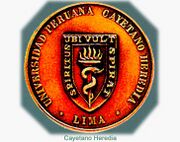Organization:Cayetano Heredia University
Universidad Peruana Cayetano Heredia | |
 | |
| Motto | Spiritus ubi vult spirat (The spirit spreads wherever it wants) |
|---|---|
| Type | Private university |
| Established | 1961 |
| Rector | Dra. Fabiola Leon Velarde |
| Location | , Peru |
| Website | www.upch.edu.pe |
Cayetano Heredia University (Spanish: Universidad Peruana Cayetano Heredia, UPCH; or simply Cayetano Heredia) is a private university located in Lima, Peru. It was named in honor of Cayetano Heredia, one of the eminent Peruvian physicians of the 19th century. The university is overseen by a Board of Trustees (patronato) and is not actually property of any private or state entity. It is considered one of the top medical schools (along the Faculty of Medicine "San Fernando" of National University of San Marcos) in Peru, and is currently the major publisher of scientific articles in the country.
History
The university was founded in 1961 by a group of professors and students from the school of medicine of the four-century-old National University of San Marcos in Lima. This group of students and professors expressed their strong disagreement with legislation, inspired by the APRA, a political party interested in the absolute control of the university system in the country. The legislation advocated the "co-government" of all the state universities by the so-called "student one-third" which would clearly politicize the academic enterprise. The dissenting group was led by Drs. Honorio Delgado and Alberto Hurtado, dean of the medical school at San Marcos. As their campaign to preserve academics failed, the 400 plus faculty members had no other option but to resign en masse, and found the new medical school as a private non-profit academic institution. This occurred, in 1961 and the first classes commenced in April 1962. Some have suggested that these events were the subject of "prior arrangements/agreements" which, in the political context of the time, would have been practically impossible. 47 years later, Cayetano Heredia and San Marcos are the most prestigious medical schools in Peru.
Organization
Administration
The rectors of the university, since its foundation, are:
- Dr.Honorio Delgado (1962–1967)
- Dr. Alberto Hurtado (1967–1969)
- Dr. Carlos Monge (1970–1972)
- Dr. Enrique Fernandez (1973–1976)
- Dr. Alberto Cazorla (1976–1977, 1984–1989)
- Dr. Homero Silva (1977–1984)
- Dr. Roger Guerra Garcia (1989–1994)
- Dr. Carlos Vidal Layseca (1994–1999)
- Dr. Ozwaldo Zegarra (1999–2007)
- Dra. Fabiola Leon Velarde (2008–2017)
- Dr. Luis Varela Pinedo (2017-)
Faculties
- Faculty of Medicine
- Faculty of Science and Philosophy
- Faculty of Stomatology
- Faculty of Psychology
- Faculty of Nursing
- Faculty of Public Health and Health Administration
- Faculty of Veterinary Medicine and Animal Breeding
- Faculty of Education
Academics
Soon after its founding and during the following forty plus years Cayetano Heredia University became a significant center of higher learning and scientific research in Peru. UPCH is credited to be responsible of world-quality research production in the area of health sciences in Peru.[1][2]
It is a rather small (under 2,000 students) school that focuses on the disciplines of medicine, dentistry, natural sciences, public health, veterinary medicine, nursing, psychology and education. It grants baccalaureate degrees as well as advanced. Master and doctoral degrees in biochemistry, biotechnology, medicine, biology, and a Master of Health Administration.
Research
Cayetano Heredia University has established numerous agreements and collaborative arrangements with leading institutions from all over the world, including the Johns Hopkins University, University of Washington, University of California San Diego, University of California Berkeley, University of Alabama at Birmingham (UAB), London School of Tropical Medicine and Hygiene, the Prince Leopold Institute of Tropical Medicine in Belgium, and the University of Pennsylvania.
The Instituto de Medicina Tropical Alexander von Humboldt (Tropical Medicine Institute) is among the top research institutions in tropical medicine in Latin America, with ongoing investigations in tuberculosis, leishmaniasis, malaria and HIV, both in its site in Lima and in several field sites such as Iquitos, Cuzco and La Merced. The institute is internationally recognized for the Gorgas Course in Clinical Tropical Medicine,[3] given jointly with UAB.
The Instituto de Investigaciones de la Altura (High Altitude Research Institute) is known for its contribution to the understanding of high altitude physiology and the pathophysiology of acute and chronic high altitude sickness.
Logo
The logo of Cayetano Heredia is a yellow shield with the words "Spiritus ubi vult spirat" on the sides. In the center is the Rod of Asclepius, which is representative of medicine and healing.[4]
Notable alumni
- Carlos Bustamante
- Ramiro Castro de la Mata
- Maria C. Freire
- Humberto Guerra Allison
- Tomas Kirchhausen
- Juan Mezzich
References
- "Universidad Peruana Cayetano Heredia" (in es). Official university site. Archived from the original on December 18, 2005. https://web.archive.org/web/20051218050857/http://www.upch.edu.pe/. Retrieved December 18, 2005.
External links
- Universidad Peruana Cayetano Heredia official website
- Universidad Peruana Cayetano Heredia alumni website

